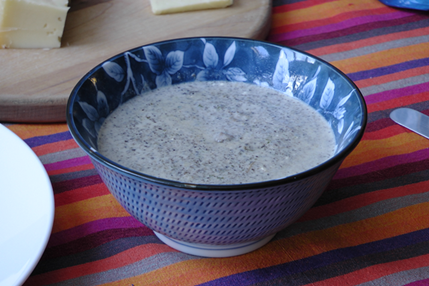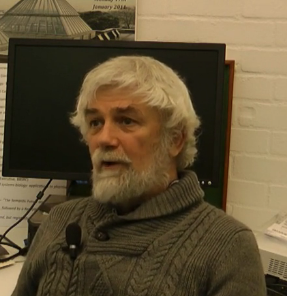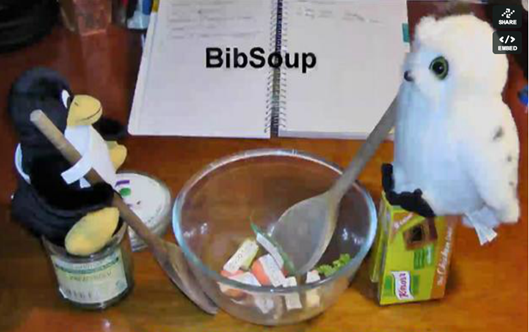
We have just finished 3 hectic days of “sprint” (design, coding, documentation, testing, deployment) on the JISC/OKF Openbiblio2 project in Cambridge. This is an Open international project, with major input from Jim Pitman in Berkeley, and offered to anyone interested in collaborating and benefitting. Before the word “bibliography” makes you switch off, don’t! EVERYONE needs bibliography. Here are some examples which show how universal bibliography is:
- Your publication list
- Your reading list
- A list of your software and the software you use
- A list of your datasets and the datasets you use
- A catalogue of the books you possess
The overall concept is “BibSoup” – a novel approach (some would call it Web 3.0) based on complete Openness of code, content and most importantly attitude. It’s based on meritocracy rather than central control. YOU control your own bibliography – a pot of BibSoup. It can be as perfect or imperfect as you like – BibSoup doesn’t mind. You don’t have to have all the information for a book (other people do that). You don’t have to have the author’s full name. If you don’t understand the difference between works, manifestations and expressions don’t worry.
The basis of BibSoup is that you build your own bibliography for your own purposes using the BibSoup technology and software. You don’t have to understand it – it’s easy to use. It consists of a server (Bibserver) which is easy to clone and deploy to hold your data. Bibserver uses JSON (“Jason”) as a transfer format (BibJSON).
You could run Bibserver on your own laptop for your own purposes (e.g. browsing all those articles).
You could run Bibserver on your website to tell the world about your Open collection and to share it with others. This is the most novel feature of BibSoup. By sharing your collection you’ll find people who are also interested in the same things. Maybe you’ll find that your annotations are valuable to others and vice versa. Maybe you’ll want to set up a group where you pool your references. But none of this is mandatory.


As Mark MacGillivray puts it (http://openbiblio.net/2012/01/17/tuesday-17th-january-open-biblio-sprint-day-1/ )
we are not trying to re-do what is already available online, we are not getting into the detail of normalisation or disambiguation within a centralised database, and we are not intending to alter the academic culture overnight; however, we are going to improve the BibJSON facility for wider use, we are trying to determine how we can get more small groups and individuals involved, and we are identifying compelling, essential and simple reasons for people to support the project at this early stage before the ultimate global benefits can be realised.
To reiterate. We are NOT compiling the one true bibliographic collection and competing with Open Library, Mendeley, Microsoft Academic Search, Google Scholar, Symplectic and other semi-open/Free collections of bibliography. We are NOT competing with Zotero as a reference manager. We, and our adopters, will these as valuable sources of bibliographic input. We ARE praising the virtues of completely open bibliographic collections such as the British National Bibliography. Our adopters may wish to use BibSoup as a way of cleaning up some collections of bibliography (references).


We believe that a completely Open ecology of bibliography will lead to communal contributions which rapidly enhance BibSoup (because Open projects belong to YOU). We want to encourage creations of bibliography (e.g. publication and reading lists) in a rapid and Open manner.
We’ve set up a series of resources:
- http://bibsoup.net/ The home page.
- http://openbibio.net The project blog (frequent postings – all our work is public)
-
http://vimeo.com/user10099867/videos PMR’s videos
Some bibliographies (just open them and browse – the “visualise” is fun if there are some high frequency components (author, journal) – facets in top-left corner).
- http://bibsoup.net/mark/markwilliamson Mark Williamson reading list – physical chemistry, mainly articles
- http://bibsoup.net/pitman/karol_m_langer_s_bibliography Karol Langner – chemical physics
- http://bibsoup.net/test/pitman Jim Pitman personal publication list
- http://bibsoup.net/pitman/berkeley_statistics_books Books published by members of Berkeley Statistics department
- [publication list from Unilever Centre – coming soon]
And some videos (apologies for some truncation and quality – we are getting a better site soon)

- http://vimeo.com/35458484 Owl and Penguin show how easy it is to make BibSoup (a toy-animal photocomic)
- http://vimeo.com/35440937 How to set up and populate a Bibserver (Mark MacGillivray)
- http://vimeo.com/35440831 The value of a personal Bibserver (Mark Williamson)
- The BibSoup team on video: http://vimeo.com/35440770 (PMR), http://vimeo.com/35440733 (MarkMcG), http://vimeo.com/35440597 (EdC) http://vimeo.com/35440644 (EtienneP),
Bibserver is EASY to use. Just login (http://bibsoup.net/account/login ) and upload your collection (Don’t try millions of records – suggest you contact us if you have more than 10,000). No software to install (although it’s all open and you can run it privately). Browse your collection anywhere on the web with any browser. And we are committed to making all these collections Easily Openly downloadable – there are no walled gardens (http://vimeo.com/34323486 ) in BibSoup.
We can ingest BibTeX, RIS and some other common formats at present. Parsers are easy to write, so join the project if yours isn’t there. BibJSON is as easy or complex as you want to make it. You can use the Open Openbiblio Bibserver or you can clone the code and run your own privately.